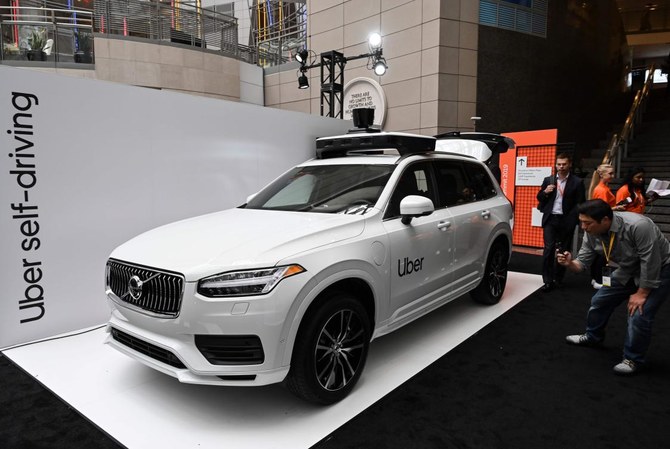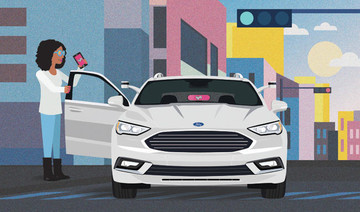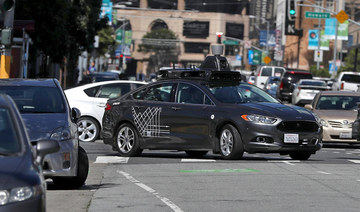WASHINGTON: Uber Technologies unveiled its newest Volvo self-driving car in Washington on Wednesday as it works to eventually deploy vehicles without drivers under some limited conditions.
Uber said the new production XC90 will be assembled by Volvo Cars in Sweden and have human controls like steering wheels and brake pedals, but also with factory-installed steering and braking systems designed for computer rather than human control.
Uber Advanced Technologies Group chief scientist Raquel Urtasun showed off the company’s artificial intelligence technology that allows it to drive autonomously for long distances on highways without maps and “on the fly” to plot its course and navigate construction zones.
“Our goal is get each one of you to where you want to go much better, much safer, cheaper,” Urtasun said.
As the race to push out autonomous cars across the globe heats up, other companies are also working to deploy self-driving vehicles in limited areas.
Ford Motor Co’s majority-owned autonomous vehicle unit, Argo AI, launched its new fleet of self-driving test vehicles — Ford Fusion Hybrid — in Detroit on Wednesday, expanding to five US cities.
The No. 2 US automaker also opened a research center in Tel Aviv, joining a growing number of major automakers and suppliers setting up shop in Israel’s tech hub.
General Motors Co. in January 2018 sought permission from US regulators to deploy a ride-sharing fleet of driverless cars without steering wheels or other human controls before the end of 2019, but is still struggling to win regulatory approval.
Alphabet Inc’s Waymo unit is operating a robotaxi service in Arizona and said last month it is partnering with Lyft Inc. to serve more riders.
South Korea’s Hyundai Motor Co. and Kia Motors Corp. both said they would invest in the self-driving car software startup Aurora and speed up development of their respective autonomous vehicle technologies.
Carmakers have struggled to maintain profit margins faced with the rising costs of making electric, connected and autonomous cars. As a result, they are setting up alliances and lining up outside investors to combat spiraling development costs.
Previously, Uber had purchased about 250 Volvo XC90 SUVs and retrofitted them for self-driving use.
The new vehicles — known by the internal code number 519G and under development for several years — are safer, more reliable and will replace the older vehicles in Uber’s fleet “soon,” according to Eric Meyhofer, the head of Uber’s Advanced Technologies Group.
“This is about going to production,” Meyhofer said in an interview at an Uber conference in Washington on Tuesday.
The new vehicle also has several backup systems for both steering and braking functions as well as backup battery power and new cybersecurity systems.
Uber is not ready to deploy vehicles without human controls, Meyhofer said.
“We’re still in a real hybrid state,” he said. “We have to get there and we’re not going to get to thousands of cars in a city overnight. It’s going to be a slower introduction.”
The new XC90 vehicles have an interior fish-eye camera to scan for lost items, Uber said. They also do not have sunroofs since the self-driving vehicles have large sensors on the roof and are equipped with auto-close doors to prevent an unsafe departure.
Uber, which has taken delivery of about a dozen prototypes of the new vehicle, but has not yet deployed them on public roads, said the car’s “self-driving system will one day allow for safe, reliable autonomous ridesharing without the need” for a safety driver.
Asked if Uber will deploy self-driving cars without safety drivers in limited areas in the next few years, Meyhofer said: “Yes — way before that.”
But he added that Uber wants to be in “the good graces of public trust and regulatory trust” before making the business decision to deploy.
In December, Uber resumed limited self-driving car testing on public roads in Pittsburgh, nine months after it suspended the program following a deadly accident in Arizona.
In March 2018, authorities in Arizona suspended Uber’s ability to test its self-driving cars after one of its XC90 cars hit and killed a woman crossing the street at night in the Phoenix suburb of Tempe, then Uber’s largest testing hub. The crash was the first death attributed to a self-driving vehicle.
In March 2019, prosecutors in Arizona said the company was not criminally liable in the crash and would not pursue charges. Uber has since ended testing in Arizona, but plans to eventually resume testing in Toronto and San Francisco, Meyhofer said.
The death prompted significant safety concerns about the nascent self-driving car industry, which is racing to get vehicles into commercial use.
Volvo Cars Chief Executive Hakan Samuelsson said in a statement that “by the middle of the next decade, we expect one-third of all cars we sell to be fully autonomous.”
Volvo Cars, which is owned by China’s Geely Automobile Holdings Ltd, will use a similar autonomous base vehicle concept for the introduction of its first commercially available autonomous drive technology in the early 2020s.
Volvo and Uber said in 2017 that the rideshare company planned to buy up to 24,000 self-driving cars from Volvo from 2019 to 2021 using the self-driving system developed by Uber’s Advanced Technologies Group.
An Uber spokeswoman said Tuesday that the company plans “to work with Volvo on tens of thousands of vehicles in the future.”
Uber unveils next-generation Volvo self-driving car
Uber unveils next-generation Volvo self-driving car

- The new vehicle has several backup systems for both steering and braking functions
- Carmakers have struggled to maintain profit margins faced with the rising costs of making electric, connected and autonomous cars
Open Forum Riyadh to discuss digital currency, AI, and mental health

- The event will run in parallel to the WEF’s Special Meeting on Global Collaboration
LONDON: The Open Forum Riyadh — a series of public sessions taking place in the Saudi capital on Sunday and Monday — will “spotlight global challenges and opportunities,” according to the organizers.
The event, a collaboration between the World Economic Forum and the Saudi Ministry of Economy and Planning, will run in parallel to the WEF’s Special Meeting on Global Collaboration, Growth and Energy for Development, taking place in Riyadh on April 28 and 29.
“Under Saudi Vision 2030, Riyadh has become a global capital for thought leadership, action and solutions, fostering the exchange of knowledge and innovative ideas,” Faisal F. Alibrahim, Saudi minister of economy and planning, said in a press release, adding that this year’s Open Forum being hosted in Riyadh “is a testament to the city’s growing influence and role on the international stage.”
The forum is open to the public and “aims to facilitate dialogue between thought leaders and the broader public on a range of topics, including environmental challenges, mental health, digital currencies, artificial intelligence, the role of the arts in society, modern-day entrepreneurship, and smart cities,” according to a statement.
The agenda includes sessions addressing the impact of digital currencies in the Middle East, the role of culture in public diplomacy, urban development for smart cities, and actions to enhance mental wellbeing worldwide.
The annual Open Forum was established in 2003 with the goal of enabling a broader audience to participate in the activities of the WEF, and has been hosted in several different countries, including Cambodia, India, Jordan and Vietnam.
The panels will feature government officials, artists, civil-society leaders, entrepreneurs, and CEOs of multinationals.
This year’s speakers include Yazeed A. Al-Humied, deputy governor and head of MENA investments at the Saudi Pubic Investment Fund; Princess Reema Bandar Al-Saud, Saudi Arabia’s ambassador to the US; and Princess Beatrice, founder of the Big Change Charitable Trust and a member of the British royal family.
Michele Mischler, head of Swiss public affairs and sustainability at the WEF, said in a press release that the participation of the public in Open Forum sessions “fosters diverse perspectives, enriches global dialogue, and empowers collective solutions for a more inclusive and sustainable future.”
Meituan looks to hire in Saudi Arabia, indicating food delivery expansion

SHANGHAI: Chinese food delivery giant Meituan is seeking to hire staff for at least eight positions based in Riyadh, in a sign it may be looking to Saudi Arabia to further its global expansion ambitions, according to Reuters.
The jobs ads, which is hiring for KeeTa, the brand name Meituan uses for its food delivery operations in Hong Kong, is seeking candidates with expertise in business development, user acquisition, and customer retention, according to posts seen by Reuters on Linkedin and on Middle Eastern jobs site Bayt.com.
Meituan did not immediately respond to a request for comment by Reuters on its plans for Saudi expansion.
Bloomberg reported earlier on Friday that the Beijing-based firm would make its Middle East debut with Riyadh as the first stop.
Since expanding to Hong Kong in May 2023, Meituan’s first foray outside of mainland China, speculation has persisted that its overseas march would continue as the firm searches for growth opportunities, with the Middle East rumored since last year to be one area of possible expansion.
“We are actively evaluating opportunities in other markets,“ Meituan CEO Wang Xing said during a post-earnings call with analysts last month.
“We have the tech know-how and operational know-how, so we are quietly confident we can enter a new market and find an approach that works for consumers there.”
IMF opens first MENA office in Riyadh

RIYADH: The International Monetary Fund has opened its first office the Middle East and North Africa region in Riyadh.
The office was launched during the Joint Regional Conference on Industrial Policy for Diversification, jointly organized by the IMF and the Ministry of Finance, on April 24.
The new office aims to strengthen capacity building, regional surveillance, and outreach to foster stability, growth, and regional integration, thereby promoting partnerships in the Middle East and beyond, according to the Saudi Press Agency.
Additionally, the office will facilitate closer collaboration between the IMF and regional institutions, governments, and other stakeholders, the SPA report noted, adding that the IMF expressed its appreciation to Saudi Arabia for its financial contribution aimed at enhancing capacity development in its member countries, including fragile states.
Abdoul Aziz Wane, a seasoned IMF director with an extensive understanding of the institution and a broad network of policymakers and academics worldwide, will serve as the first director of the Riyadh office.
Saudi minister to deliver keynote speech at Automechanika Riyadh conference

RIYADH: Saudi Arabia’s Deputy Minister of Investment Transaction Saleh Al-Khabti is set to deliver the keynote speech at a global automotive aftermarket industry conference in Riyadh.
Set to be held from April 30 April to May 2 in the Saudi capital’s International Convention and Exhibition Center, Automechanika Riyadh will welcome more than 340 exhibitors from over 25 countries.
Al-Khabti will make the marquee address on the first day of the event, which will also see participation from Aftab Ahmed, chief advisor for the Automotive Cluster at the National Industrial Development Centre, Ministry of Industry and Mineral Resources.
Saudi Arabia’s automotive sector is undergoing a transformation, with the Kingdom’s Public Investment Fund becoming the major shareholder in US-based electric vehicle manufacturer Lucid, and also striking a deal with Hyundai to collaborate on the construction of a $500 million-manufacturing facility.
Alongside this, Saudi Arabia’s Crown Prince Mohammed bin Salman launched the Kingdom’s first electric vehicle brand in November 2022.
Commenting on the upcoming trade show, Bilal Al-Barmawi, CEO and founder of 1st Arabia Trade Shows & Conferences, said: “It is a great honor for Automechanika Riyadh to be held under the patronage of the Saudi Arabian Ministry of Investment, and we’re grateful for their continued support as the event goes from strength-to-strength.
“The insights and support we’ve already received have been invaluable, and we look forward to continuing this relationship throughout the event and beyond.”
This edition of Automechanika Riyadh will feature seven product focus areas, including parts and components, tyres and batteries, and oils and lubricants.
Accessories and customizing, diagnostics and repairs, and body and paint will also be discussed, as well as care and wash.
Aly Hefny, show manager for Automechanika Riyadh, Messe Frankfurt Middle East, said: “The caliber of speakers confirmed to take part at Automechanika Riyadh is a testament to the event’s growth and prominence within the regional automotive market.
“We have developed a show that goes beyond the norm by providing a platform that supports knowledge sharing and networking while promoting the opportunity to engage with key industry experts and hear the latest developments, trends and innovations changing the dynamics of the automotive sector.”
Aramco-backed S-Oil expects Q2 refining margins to remain steady then trend upward

SEOUL: South Korea’s S-Oil forecast on Friday that second-quarter refining margins will be steady, supported by regular maintenance in the region, then trend upward in tandem with higher demand as the summer season gets underway, according to Reuters.
Over the January-March period, the refiner said it operated the crude distillation units at its 669,000-barrel-per-day oil refinery in the southeastern city of Ulsan at 91.9 percent of capacity, compared with 94 percent in October-December.
S-Oil, whose main shareholder is Saudi Aramco, plans to shut its No. 1 crude distillation unit sometime this year for maintenance, the company said in an earnings presentation, without specifying the time.


















